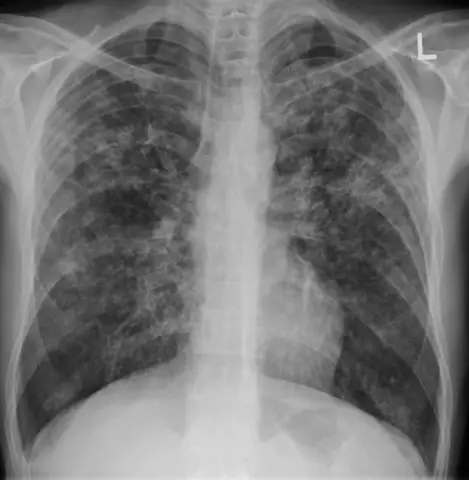- Author Rachel Wainwright wainwright@abchealthonline.com.
- Public 2023-12-15 07:39.
- Last modified 2025-11-02 20:14.
Prolactinoma
General characteristics of the disease

Prolactinoma is a type of benign tumor of the pituitary gland. Prolactinomas of malignant etiology are extremely rare. Prolactinoma causes an increase in the size of the pituitary gland and an increase in the production of the hormone prolactin in the body (hence the name of the disease).
Prolactinoma is one of the most common types of tumors. Postmortem autopsy of the brain revealed the presence of pituitary prolactinoma in 25% of patients. In a quarter of cases during life, the tumor did not behave aggressively and did not affect the secretion of hormones. In another 40% of cases, due to the small size of the tumor, the symptoms of prolactinoma were not expressed. Usually, these tumors did not exceed 3 mm in size.
And only in the remaining 35% of people with identified pituitary prolactinoma, the disease was characterized by rapid tumor growth and a rapid increase in the size of the pituitary gland. The reasons provoking in some cases the aggressiveness of the pituitary prolactinoma are still unknown to medicine.
Prolactinoma symptoms
Normally, the level of prolactin in a woman's body increases during pregnancy and breastfeeding. The quality of lactation depends on this hormone.
With pathological oversecretion of prolactin caused by the growth of pituitary prolactinoma, a woman develops hyperprolactinemia.
Among the symptoms of prolactinoma are menstrual irregularities. In patients with pituitary prolactinoma, the following are possible:
- oligomenorrhea (short duration of menstrual bleeding).
- opsomenorrhea (rare menstruation with a cycle of 35 days or more),
- as well as amenorrhea (absence of menstruation).
Menstrual irregularities in pituitary prolactinoma are triggered by pathologies in the production of luteinizing and follicle-stimulating hormones caused by high levels of prolactin in the body.
Another important symptom of prolactinoma in women is galactorrhea or milk secretion from the mammary glands. This phenomenon develops as a result of a natural physiological effect: the level of prolactin rises, and the woman's breast prepares for lactation. Galactorrhea does not lead to oncology of the mammary glands, but increases the risk of developing mastopathy (benign proliferation of breast tissue).
Patients with pituitary prolactinoma also often complain of headache. This symptom of prolactinoma is associated with hormonal imbalance in a woman's body.
In men, symptoms of prolactinoma include gynecomastia (enlargement of the mammary glands). Prolactin inhibits the production of the male hormone testosterone. Therefore, another striking symptom of prolactinoma is a decrease in libido, up to the development of impotence. Pituitary prolactinoma in men can also lead to infertility, and particularly large tumors cause vision problems.

Large prolactinomas are more common in male patients. Most women are diagnosed with pituitary microadenomas.
Diagnosis of prolactinoma
Blood tests can determine the level of prolactin in the body. Visualization of pituitary prolactinoma occurs using contrast magnetic resonance imaging. In case of large tumors, better quality outlines of prolactinoma can be obtained by computed tomographic scanning of the brain.
Prolactinoma treatment
Treatment of prolactinoma can be conservative and surgical. With a small tumor, the treatment of prolactinoma begins with conservative therapy. The drugs that reduce the secretion of prolactin include: Parlodel, Levodop, Lizurid, Peritol, Lergotril, etc. Conservative treatment of small prolactinoma is effective in 85% of cases.
In case of ineffective treatment of prolactinoma with conservative methods, it is recommended to carry out radiation irradiation and subsequent microsurgical removal of the pituitary tumor. The results of surgical treatment of prolactinoma are usually good. Within 2-3 months after the removal of the tumor, the prolactin level returns to normal. In women, by this time, the menstrual cycle is restored, in men, libido increases and the quality of erection improves.
YouTube video related to the article:
The information is generalized and provided for informational purposes only. At the first sign of illness, see your doctor. Self-medication is hazardous to health!






